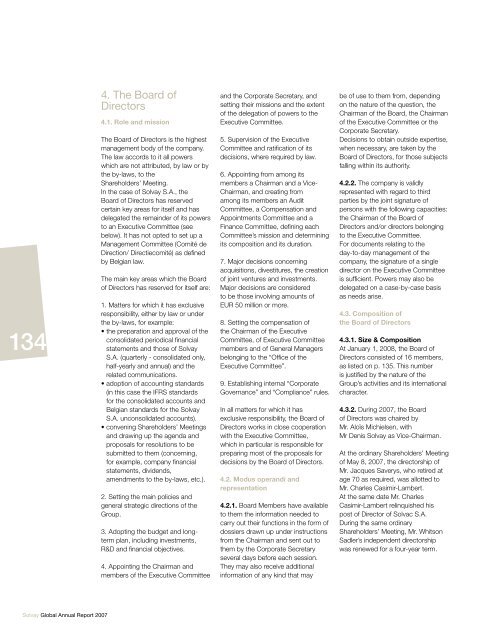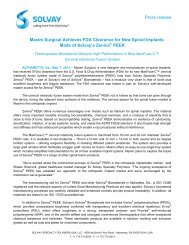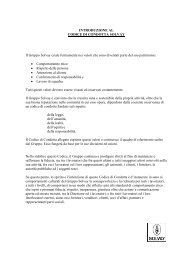+1 - Solvay
+1 - Solvay
+1 - Solvay
You also want an ePaper? Increase the reach of your titles
YUMPU automatically turns print PDFs into web optimized ePapers that Google loves.
134<br />
4. The Board of<br />
Directors<br />
4.1. Role and mission<br />
The Board of Directors is the highest<br />
management body of the company.<br />
The law accords to it all powers<br />
which are not attributed, by law or by<br />
the by-laws, to the<br />
Shareholders' Meeting.<br />
In the case of <strong>Solvay</strong> S.A., the<br />
Board of Directors has reserved<br />
certain key areas for itself and has<br />
delegated the remainder of its powers<br />
to an Executive Committee (see<br />
below). It has not opted to set up a<br />
Management Committee (Comité de<br />
Direction/ Directiecomité) as defined<br />
by Belgian law.<br />
The main key areas which the Board<br />
of Directors has reserved for itself are:<br />
1. Matters for which it has exclusive<br />
responsibility, either by law or under<br />
the by-laws, for example:<br />
• the preparation and approval of the<br />
consolidated periodical financial<br />
statements and those of <strong>Solvay</strong><br />
S.A. (quarterly - consolidated only,<br />
half-yearly and annual) and the<br />
related communications.<br />
• adoption of accounting standards<br />
(in this case the IFRS standards<br />
for the consolidated accounts and<br />
Belgian standards for the <strong>Solvay</strong><br />
S.A. unconsolidated accounts).<br />
• convening Shareholders’ Meetings<br />
and drawing up the agenda and<br />
proposals for resolutions to be<br />
submitted to them (concerning,<br />
for example, company financial<br />
statements, dividends,<br />
amendments to the by-laws, etc.).<br />
2. Setting the main policies and<br />
general strategic directions of the<br />
Group.<br />
3. Adopting the budget and longterm<br />
plan, including investments,<br />
R&D and financial objectives.<br />
4. Appointing the Chairman and<br />
members of the Executive Committee<br />
and the Corporate Secretary, and<br />
setting their missions and the extent<br />
of the delegation of powers to the<br />
Executive Committee.<br />
5. Supervision of the Executive<br />
Committee and ratification of its<br />
decisions, where required by law.<br />
6. Appointing from among its<br />
members a Chairman and a Vice-<br />
Chairman, and creating from<br />
among its members an Audit<br />
Committee, a Compensation and<br />
Appointments Committee and a<br />
Finance Committee, defining each<br />
Committee’s mission and determining<br />
its composition and its duration.<br />
7. Major decisions concerning<br />
acquisitions, divestitures, the creation<br />
of joint ventures and investments.<br />
Major decisions are considered<br />
to be those involving amounts of<br />
EUR 50 million or more.<br />
8. Setting the compensation of<br />
the Chairman of the Executive<br />
Committee, of Executive Committee<br />
members and of General Managers<br />
belonging to the “Office of the<br />
Executive Committee”.<br />
9. Establishing internal “Corporate<br />
Governance” and “Compliance” rules.<br />
In all matters for which it has<br />
exclusive responsibility, the Board of<br />
Directors works in close cooperation<br />
with the Executive Committee,<br />
which in particular is responsible for<br />
preparing most of the proposals for<br />
decisions by the Board of Directors.<br />
4.2. Modus operandi and<br />
representation<br />
4.2.1. Board Members have available<br />
to them the information needed to<br />
carry out their functions in the form of<br />
dossiers drawn up under instructions<br />
from the Chairman and sent out to<br />
them by the Corporate Secretary<br />
several days before each session.<br />
They may also receive additional<br />
information of any kind that may<br />
be of use to them from, depending<br />
on the nature of the question, the<br />
Chairman of the Board, the Chairman<br />
of the Executive Committee or the<br />
Corporate Secretary.<br />
Decisions to obtain outside expertise,<br />
when necessary, are taken by the<br />
Board of Directors, for those subjects<br />
falling within its authority.<br />
4.2.2. The company is validly<br />
represented with regard to third<br />
parties by the joint signature of<br />
persons with the following capacities:<br />
the Chairman of the Board of<br />
Directors and/or directors belonging<br />
to the Executive Committee.<br />
For documents relating to the<br />
day-to-day management of the<br />
company, the signature of a single<br />
director on the Executive Committee<br />
is sufficient. Powers may also be<br />
delegated on a case-by-case basis<br />
as needs arise.<br />
4.3. Composition of<br />
the Board of Directors<br />
4.3.1. Size & Composition<br />
At January 1, 2008, the Board of<br />
Directors consisted of 16 members,<br />
as listed on p. 135. This number<br />
is justified by the nature of the<br />
Group’s activities and its international<br />
character.<br />
4.3.2. During 2007, the Board<br />
of Directors was chaired by<br />
Mr. Aloïs Michielsen, with<br />
Mr Denis <strong>Solvay</strong> as Vice-Chairman.<br />
At the ordinary Shareholders’ Meeting<br />
of May 8, 2007, the directorship of<br />
Mr. Jacques Saverys, who retired at<br />
age 70 as required, was allotted to<br />
Mr. Charles Casimir-Lambert.<br />
At the same date Mr. Charles<br />
Casimir-Lambert relinquished his<br />
post of Director of Solvac S.A.<br />
During the same ordinary<br />
Shareholders’ Meeting, Mr. Whitson<br />
Sadler’s independent directorship<br />
was renewed for a four-year term.<br />
<strong>Solvay</strong> Global Annual Report 2007
















